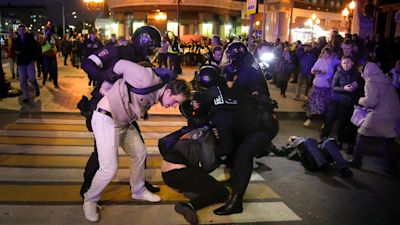Russia arrests more than 1,300 as military mobilisation ignites protests

More than 1,300 people in Russia have been arrested at protests denouncing mobilisation, a rights group has said.
Rare demonstrations erupted across the country after President Vladimir Putin ordered a partial mobilisation of reservists on Wednesday to bolster his forces in Ukraine.
Despite Russia’s harsh laws against criticising the military and the war, outraged protesters took to the streets of 39 cities, including Moscow and St Petersburg.
At least 1,310 Russians were arrested in the demonstrations, according to the independent Russian human rights group OVD-Info.
Associated Press journalists in Moscow witnessed at least a dozen arrests in the first 15 minutes of a night-time protest in the capital, with police in heavy body armour tackling demonstrators in front of shops, hauling some away as they chanted, “No to war!”.
“I’m not afraid of anything. The most valuable thing that they can take from us is the life of our children. I won’t give them the life of my child,” said one protester, who declined to give her name.
In Yekaterinburg, Russia’s fourth-largest city, police hauled onto buses some of the 40 protesters who were detained at an anti-war rally.
Want a quick and expert briefing on the biggest news stories? Listen to our latest podcasts to find out What You Need To Know
The mobilisation order follows humiliating setbacks for President Putin’s troops nearly seven months after they invaded Ukraine. The first such call-up in Russia since World War Two heightened tensions with Ukraine’s Western backers, who derided it as an act of weakness and desperation.
Within Russia itself, the Vesna opposition movement called for protests, saying: “Thousands of Russian men - our fathers, brothers and husbands -will be thrown into the meat grinder of the war. What will they be dying for? What will mothers and children be crying for?”
The Moscow prosecutor’s office warned that organising or participating in protests could lead to up to 15 years in prison. Authorities have issued similar warnings ahead of other protests.
Wednesday’s were the first nationwide anti-war protests since the fighting began in late February.
Other Russians responded by trying to leave the country, and flights out quickly became booked.
In Armenia, Russian man Sergey arrived with his 17-year-old son, saying they had prepared for such a scenario. Another Russian, Valery, said his wife’s family lives in Kyiv, and mobilisation is out of the question for him “just for the moral aspect alone”. Both men declined to give their last names.
The state communication watchdog Roskomnadzor warned media that access to their websites would be blocked for transmitting “false information” about the mobilisation.
Russian opposition leader Alexei Navalny said the mobilisation means the war “is getting worse, deepening, and Putin is trying to involve as many people as possible. … it’s being done just to let one person keep his grip on personal power”.
The partial mobilisation order came two days before Russian-controlled regions in eastern and southern Ukraine plan to hold referendums on becoming part of Russia - a move that could allow Moscow to escalate the war.
The voting starts on Friday in the Luhansk, Kherson and partly Russian-controlled Zaporizhzhia and Donetsk regions.
Foreign leaders are already calling the votes illegitimate and non-binding.
Ukraine's President Zelenskyy said they were a “sham” and “noise” to distract the public.